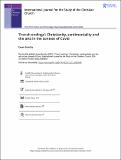Files in this item
‘French endings’ : Christianity, sentimentality and the arts in the context of Covid
Item metadata
| dc.contributor.author | Bowlby, Ewan | |
| dc.date.accessioned | 2022-07-21T12:30:01Z | |
| dc.date.available | 2022-07-21T12:30:01Z | |
| dc.date.issued | 2022-06-02 | |
| dc.identifier | 279738458 | |
| dc.identifier | d4a5aadb-a845-4990-b05f-ce759009a079 | |
| dc.identifier | 85131425162 | |
| dc.identifier | 000805246500001 | |
| dc.identifier.citation | Bowlby , E 2022 , ' ‘French endings’ : Christianity, sentimentality and the arts in the context of Covid ' , International Journal for the Study of the Christian Church , vol. Latest Articles . https://doi.org/10.1080/1474225X.2022.2080929 | en |
| dc.identifier.issn | 1474-225X | |
| dc.identifier.uri | https://hdl.handle.net/10023/25682 | |
| dc.description | This work was supported by the Scottish Graduate School for the Arts and Humanities (SGSAH) through an AHRC doctoral training partnership award. | en |
| dc.description.abstract | This article draws attention to the need for a theological approach to sentimentality in the arts that is informed by context. During the Covid pandemic, the value of sentimental artworks that afford respite and distraction from the grim realities of death and disease has been evident. To illustrate the dangers of absolutist, anti-sentimentalist theological arguments that overlook the significance of context in such circumstances, this article presents a challenge to the theological ‘countersentimentality’ set out by Jeremy Begbie. I argue that condemning all sentimentality in contemporary culture as a ‘disease of the feelings’ manifested in people and the arts, without paying attention to the context in which people seek out sentimental artworks, is inadvisable. Then, through analysis of two examples from literary fiction, I illustrate the weaknesses of a theological countersentimentality that evaluates artworks without reference to the situation in which they were created and received. | |
| dc.format.extent | 13 | |
| dc.format.extent | 694666 | |
| dc.language.iso | eng | |
| dc.relation.ispartof | International Journal for the Study of the Christian Church | en |
| dc.subject | Sentimentality | en |
| dc.subject | Theological aesthetics | en |
| dc.subject | Begbie | en |
| dc.subject | Popular culture | en |
| dc.subject | Literature | en |
| dc.subject | Dostoevsky | en |
| dc.subject | Escapism | en |
| dc.subject | Emily in Paris | en |
| dc.subject | Pandemic | en |
| dc.subject | Dickens | en |
| dc.subject | BR Christianity | en |
| dc.subject | T-NDAS | en |
| dc.subject | NIS | en |
| dc.subject.lcc | BR | en |
| dc.title | ‘French endings’ : Christianity, sentimentality and the arts in the context of Covid | en |
| dc.type | Journal article | en |
| dc.contributor.institution | University of St Andrews. School of Divinity | en |
| dc.identifier.doi | https://doi.org/10.1080/1474225X.2022.2080929 | |
| dc.description.status | Peer reviewed | en |
This item appears in the following Collection(s)
Items in the St Andrews Research Repository are protected by copyright, with all rights reserved, unless otherwise indicated.

